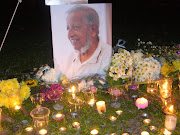The thesis is titled Democracy and elections: The impact of online politics in Singapore. I call the research findings he presented at the media doorstop The Gomez Findings.
According to the findings,
Alternative online political content has had no impact on voting patterns and electoral results.I see the Gomez Findings as a rallying wake-up call for wider action to effectively combine alternative online politics with offline "boots-on-the-ground" activities and initiatives to bring about real reforms and change in Singapore.
The evidence shows that the political structure, and in particular, the electoral system, rather than the availability of alternative online political content, accounts for the electoral outcomes in Singapore.
The current electoral system in Singapore is impervious to the impact of the internet. Hence, the freedom and ability to distribute alternative political content as a manifestation of voter sentiment will not lead to a change in electoral results.
The study points to a need for electoral system reform to more accurately translate voter sentiment into parliamentary seats.
The Gomez Findings
Gomez, James “Democracy and Elections: The Impact of Online Politics in Singapore.” PhD thesis, Monash University, Melbourne, 2008.
Aim of study
The main goal of this study was to evaluate the impact of alternative online political content on Singaporean multi-party democracy. Ever since the internet became publicly available in Singapore in 1995, different activist groups have sought to use the medium in a bid to overcome the neglect, bias and censorship of the local mainstream media’s coverage of opposition parties. These groups believed that if they used the internet to provide alternative political content, it might mitigate the censorship and bias in local mainstream media coverage of opposition parties especially during elections. This study is the first detailed analysis of the internet’s influence on voting patterns and electoral results in Singapore over a period of 12 years and three general elections (1997,2001, 2006).
Main findings of study
1. The internet is a niche platform for distributing alternative political content
The internet has emerged as a platform for civil society, opposition parties, international organizations and individual activists to produce and distribute alternative political content about the PAP government and politics in Singapore that would otherwise not be available on local mainstream media because of omission, bias or censorship.
The volume of such information and the innovation surrounding its production and distribution is mirrored by the rise in internet home penetration in Singapore during each election year. In 1997 it was 14%, in 2001 it was 57% and in 2006 it was 71% (See Table 1). The projections for 2011 is 86.66% and 2015 is 91.38% (See Table 2). The rising level of internet penetration projected for the coming years, further establishes that the internet will continue to be a significant medium through which alternative political content will be disseminated during and in-between elections.
Various statistical studies show that the internet as a source of political information remains low and predominantly confined to the young and educated. Thus far it has not been able to rival the local mainstream media’s domination position in the delivery of content. Hence, it remains a niche media, which is growing and will grow further in the next 10 years, but it will not be large enough to have mass outreach under the present circumstances in Singapore.
2. Alternative online political content has had no impact on voting patterns and electoral results
An analysis of elections results over 12 years covering the last three general elections (1997, 2001 and 2006) shows that there has been no change in the nett electoral results for opposition parties. Although the major opposition parties claim that the internet has helped boost membership and supporters and on occasions forced the local media to cover opposition party activities and statements, the findings of the research show that these have not translated in term of gains in parliamentary seats (See Tables 3-5).
Further, in terms of the number of parliamentary seats contested (both single and group seats) and the number of candidates fielded by opposition parties (see Table 6) there is no correlation between these numbers, use of internet by opposition parties and the availability of alternative online political content during and in-between elections. Similarly, there is no correlation between use of the internet by opposition parties and the availability of alternative online content and the percentage of votes cast for opposition parties (see Tables 7-9).
Voter statistics show that since Singapore’s independence, the number of eligible voters has risen from 756,367 fro the 1968 elections to 2,158,704 in 2006 (see Table 10). However, voters that have cast their ballots in contested electoral wards throughout all elections remain roughly around 55.7 percent. If we look specifically at the elections years 1997, 2001, and 2007, voter participation was 40.7%, 33.2% and 56.6% respectively (see Table 10). There is no correlation to the level of voter participation at each election in Singapore and the level of internet home penetration. Rather, the actual number of voters who cast their ballot at each election is directly linked to the total volume of voters registered in the wards that are contested during an election (see Table 11).
Conclusion
The evaluation of the reach of alternative online political content and its impact on election results and voter statistics show that the primary shortcoming of Singapore’s present electoral system is the tendency to yield disproportionate representation in favour of the PAP. Over the last 12 years and through three general elections, when alternative online content was available during and in-between elections, it has had no effect on the PAP’s overall electoral results. While support for the PAP has fluctuated in the last four general elections (1991, 1997, 2001 and 2006) by 14.3 percentage points, the variation in percentage of seats was by 2.5 percentage points (see Table 12).
The evidence shows that the political structure, and in particular, the electoral system, rather than the availability of alternative online political content, accounts for the electoral outcomes in Singapore.
The current electoral system in Singapore is impervious to the impact of the internet. Hence, the freedom and ability to distribute alternative political content as a manifestation of voter sentiment will not lead to a change in electoral results. The study points to a need for electoral system reform to more accurately translate voter sentiment into parliamentary seats.
Tables - Gomez Findings














7 comments:
It is a pity that Gomez Findings are negative. He forgot the Anwar's factor.
For more detailed discussions on these important topics, see:
Singapore Kopitiam
http://forums.delphiforums.com/sunkopitiam/messages/
Hi Jacob,
Surprised to see you online.
Cheers,
Michael Cheng
I don't doubt the findings may appear negative to some. Maybe sobering is a word i'm looking for here. One has to remember that the findings are in relation to the electoral outcome. Thats why i said it should be taken as a rallying wake-up call instead of viewing it negatively. :-)
Hi Michael, i hope it was a pleasant surprise! :-)
"It is a pity that Gomez Findings are negative. He forgot the Anwar's factor."
What Gomez says is true.
"Similarly, there is no correlation between use of the internet by opposition parties and the availability of alternative online content and the percentage of votes cast for opposition parties"
Anwar's case is supplemented by fact and reality that citizen there experience and observe corruption first hand in the country and therefore internet serve to strengthen the belief and unity. However, in Singapore, how many people are naive and gullible to believe the government here ? Majority ! Because as long as one has food for stomach, and job to keep, people here are happy to ignore everything else and move on, even if legalised corruption is in place. Internet then does not garner Singaporean's support because they are content with their life and needs. Recall Maslow's_hierarchy_of_needs ?
http://en.wikipedia.org/wiki/Maslow's_hierarchy_of_needs
in my amatuerish opinion,
i dont think this can be used as a good measure or an accurate reference to sg's electorial/voting process. in short, the whole god damn election.
bcos, not every right-to-vote citizens had the chance to vote during the past election, and as far as i see, not even in the next election. simply cos there were many walk over constituencies.
furthermore, look how they redrew their territorial lines of constituencies! how can redhill or bukit merah be under Tanjong Pajar constituency? *hint hint* smells so fishy
if its really fair, hold the by-election of Jurong constituency now, after tat chap passed away (may he RIP). what have they got to lose? maybe the whole constituency to the opposition dare we say?
lets say 100% or maybe even 70/80/90 percent of all rightful voters had cast their votes, results would definitely be different - for the election and probably this 'Findings'
the whatever "66.6%" thingy might turn out to be 33.3% instead.
LOL
oh yeah, secondly, for table 1, home computer and internet penetration. the rise in figures is mostly due to the growth of tecnology in our society. almost every household has 1 or more computers now. 1 desktop, 1 or more laptops. almost every schoolkid has a desktop or laptop nowadays.
this statistic, does it include the figures of the population under the age of 21? cos they are not eligible voters at all. i doubt many of them give 2 hoots about local politics.
the statistics of table 1 shld only be of citizens/eligible voters aged 21 and above. otherwise, its not accurately related.
- just a wildly imaginative speculation
PS. and yeah, look how internet forums, chatter and influences caused an upset during the msian election. will it ever happen in sg?
anyways, bah humbug! theres little we can do. just suck thumb.
Cheers,
bbb
"I see the Gomez Findings as a rallying wake-up call for wider action to effectively combine alternative online politics with offline "boots-on-the-ground" activities and initiatives to bring about real reforms and change in Singapore."
How did you make that leap? Based on faith or logic?
There are so many cheesy holes in this report. I dont even know where to begin. Not only on the substantive side, but also in the way the statistics are manipulated and presented without the author even pointing out the obvious caveats.
This is a bit like the case of a dodgy house agent selling you an apartment and claiming you have the benefit of a scenic view, but leaving out the fact it used to be a nuclear test site a few years ago!
Gomez is lucky his thesis was not posted in a friendly brotherhood site.
Those boys would tear at it like a pack of rabid hound dogs and his thesis will look very much like a helpless rag doll.
Pity. Great pity.
editor in thief
Dear editor in thief,
As i've mentioned in my blogpost, these are the research findings from his PhD thesis and not the full thesis itself.
In fact, what i've posted here is a media summary of the research findings. And as it is in other universities across the world, Monash University's process in awarding the PhD would obviously involve “tearing at it” before conferring the PhD based on the full thesis.
As for what I wrote about it being a rallying wake-up call, combining alternative online politics with offline activities/initiatives should be an option to be seriously considered and acted upon. Its not a leap of any kind. More of progressing to the next step.
Post a Comment